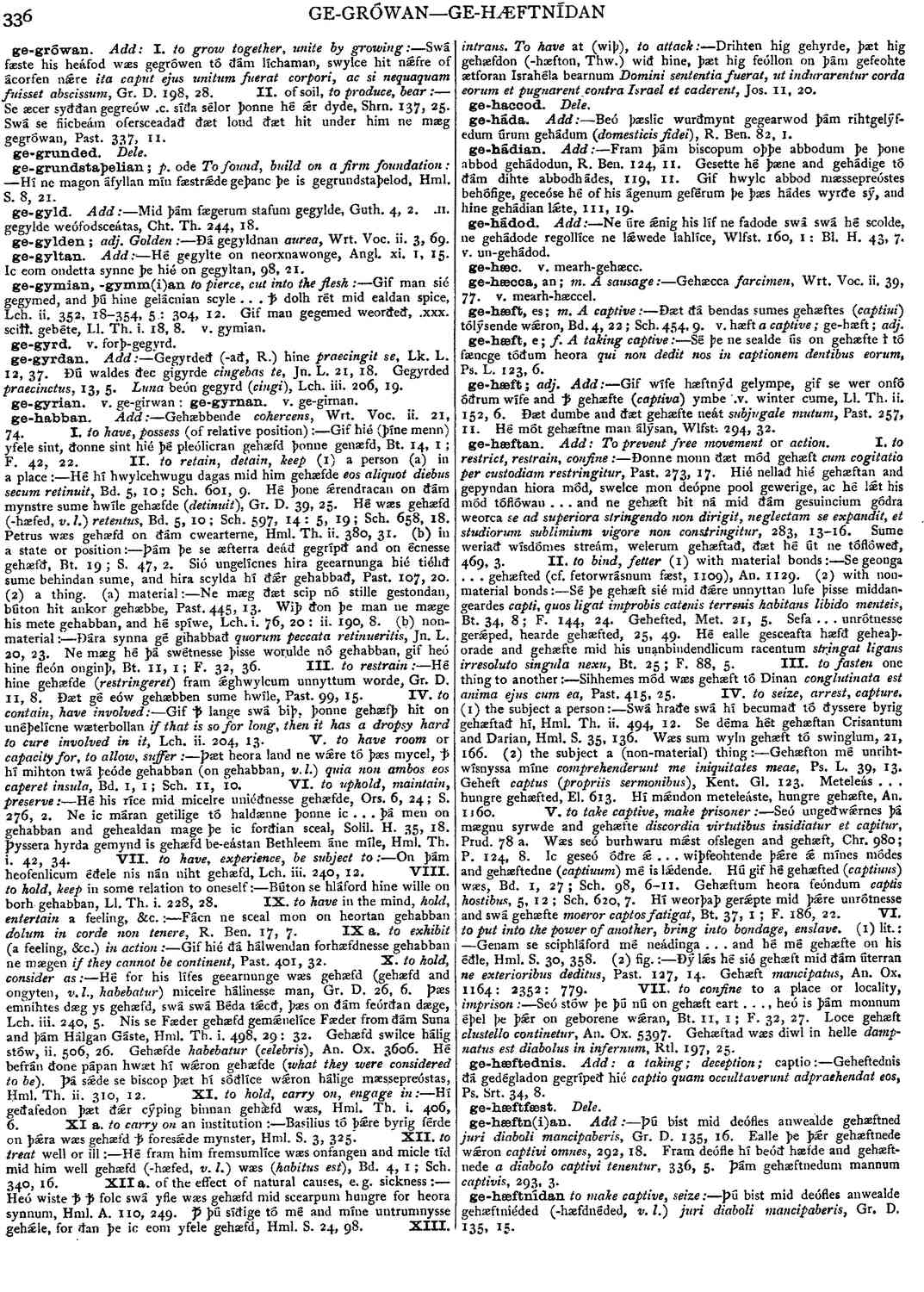ge-habban
- verb
-
Gehæbbende
cohercens,
- Wrt. Voc. ii. 21, 74.
-
Gif hié (þíne menn) yfele sint, ðonne sint hié þé pleólicran gehæfd þonne genæfd,
- Bt. 14, 1; F. 42, 22.
-
Hé hí hwylcehwugu dagas mid him gehæfde
eos aliquot diebus secum retinuit,
- Bd. 5, 10; Sch. 601, 9.
-
Hé þone ǽrendracan on ðám mynstre sume hwíle gehæfde (
detinuit
),- Gr. D. 39, 25.
-
Hé wæs gehæfd (-hæfed,
v. l.) retentus,
- Bd. 5, 10; Sch. 597, 14: 5, 19; Sch. 658, 18.
-
Petrus wæs gehæfd on ðám cwearterne,
- Hml. Th. ii. 380, 31.
-
Þám þe se æfterra deáð gegrípð and on écnesse gehæfð,
- Bt. 19; S. 47, 2.
-
Sió ungelícnes hira geearnunga hié tiéhð sume behindan sume, and hira scylda hí ðǽr gehabbað,
- Past. 107, 20.
-
Ne mæg ðæt scip nó stille gestondan, búton hit ankor gehæbbe,
- Past. 445, 13.
-
Wiþ ðon þe man ne mæge his mete gehabban, and hé spíwe,
- Lch. i. 76, 20: ii. 190, 8.
-
Ðára synna gé gihabbað
quorum peccata retinueritis,
- Jn. L. 20, 23.
-
Ne mæg hé þá swétnesse þisse worulde nó gehabban, gif heó hine fleón onginþ,
- Bt. 11, 1; F. 32, 36.
-
Hé hine gehæfde (
restringeret
) fram ǽghwylcum unnyttum worde,- Gr. D. 11, 8.
-
Ðæt gé eów gehæbben sume hwíle,
- Past. 99, 15.
-
Gif ꝥ lange swá biþ, þonne gehæfþ hit on unéþelícne wæterbollan
if that is so for long, then it has a dropsy hard to cure involved in it,
- Lch. ii. 204, 13.
-
Þæt heora land ne wǽre tó þæs mycel, ꝥ hí mihton twá þeóde gehabban (on gehabban,
v. l.) quia non ambos eos caperet insula,
- Bd. 1, 1; Sch. 11, 10.
-
Hé his ríce mid micelre uniéðnesse gehæfde,
- Ors. 6, 24; S. 276, 2.
-
Ne ic máran getilige tó haldænne þonne ic . . . þá men on gehabban and gehealdan mage þe ic forðian sceal,
- Solil. H. 35, 18.
-
Þyssera hyrda gemynd is gehæfd be-eástan Bethleem áne míle,
- Hml. Th. i. 42, 34.
-
On þám heofenlicum éðele nis nán niht gehæfd,
- Lch. iii. 240, 12.
-
Búton se hláford hine wille on borh gehabban,
- Ll. Th. i. 228, 28.
-
Fácn ne sceal mon on heortan gehabban dolum in corde non tenere, R. Ben. 17, 7. IX a. to exhibit (a feeling, &c.) in action :-- Gif hié ðá hálwendan forhæfdnesse gehabban ne mægen
if they cannot be continent,
- Past. 401, 32.
-
Hé for his lífes geearnunge wæs gehæfd (gehæfd and ongyten,
v. l., habebatur
) micelre hálinesse man,- Gr. D. 26, 6.
-
Þæs emnihtes dæg ys gehæfd, swá swá Béda tǽcð, þæs on ðám feórðan dæge,
- Lch. iii. 240, 5.
-
Nis se Fæder gehæfd gemǽnelíce Fæder from ðám Suna and þám Hálgan Gáste,
- Hml. Th. i. 498, 29: 32.
- Gehæfd swilce hálig stów, ii. 506, 26.
-
Gehæfde
habebatur (celebris ),
- An. Ox. 3606.
-
Hé befrán ðone pápan hwæt hí wǽron gehæfde (
what they were considered to be
). Þá sǽde se biscop þæt hí sóðlíce wǽron hálige mæssepreóstas,- Hml. Th. ii. 310, 12.
-
Hí geðafedon þæt ðǽr cýping binnan gehæfd wæs, Hml. Th. i. 406, 6. XI a.
to carry on
an institution :-- Basilius tó þǽre byrig férde on þǽra wæs gehæfd ꝥ foresǽde mynster,- Hml. S. 3, 325.
-
Hé fram him fremsumlíce wæs onfangen and micle tíd mid him well gehæfd (-hæfed,
v. l.) wæs (habitus est ),
- Bd. 4, 1; Sch. 340, 16.
- XII a. of the effect of natural causes, e. g. sickness :---
-
Ꝥ þú síðige tó mé and míne untrumnysse gehǽle, for ðan þe ic eom yfele gehæfd,
- Hml. S. 24, 98.
-
Drihten hig gehyrde, þæt hig gehæfdon (-hæfton, Thw.) wið hine, þæt hig feóllon on þám gefeohte ætforan Israhéla bearnum
Domini sententia fuerat, ut indurarentur corda eorum et pugnarent contra Israel et caderent,
- Jos. 11, 20.
Bosworth, Joseph. “ge-habban.” In An Anglo-Saxon Dictionary Online, edited by Thomas Northcote Toller, Christ Sean, and Ondřej Tichy. Prague: Faculty of Arts, Charles University, 2014. https://bosworthtoller.com/48179.
Checked: 0